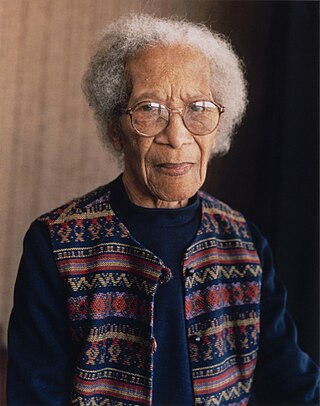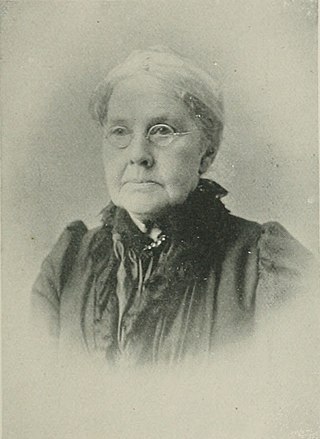
The National Society Daughters of the American Revolution is a lineage-based membership service organization for women who are directly descended from a person involved in the United States' struggle for independence. A non-profit group, they promote education and patriotism. The organization's membership is limited to direct lineal descendants of soldiers or others of the Revolutionary period who aided the cause of independence; applicants must have reached 18 years of age and are reviewed at the chapter level for admission. The DAR has over 185,000 current members in the United States and other countries. Its motto is "God, Home, and Country".

Carrie Chapman Catt was an American women's suffrage leader who campaigned for the Nineteenth Amendment to the United States Constitution, which gave U.S. women the right to vote in 1920. Catt served as president of the National American Woman Suffrage Association from 1900 to 1904 and 1915 to 1920. She founded the League of Women Voters in 1920 and the International Woman Suffrage Alliance in 1904, which was later named International Alliance of Women. She "led an army of voteless women in 1919 to pressure Congress to pass the constitutional amendment giving them the right to vote and convinced state legislatures to ratify it in 1920" and "was one of the best-known women in the United States in the first half of the twentieth century and was on all lists of famous American women."

Oveta Culp Hobby was an American government official and businesswoman who served as the first United States secretary of health, education, and welfare from 1953 to 1955. A member of the Republican Party, Hobby was the second woman ever to serve in a presidential cabinet.

Margaret Antoinette Clapp was an American scholar, educator and Pulitzer Prize winner. She was the president of Wellesley College from 1949 to 1966.
Niara Sudarkasa was an American scholar, educator, Africanist and anthropologist who holds thirteen honorary degrees, and is the recipient of nearly 100 civic and professional awards. In 1989 Essence magazine named her "Educator for the '90s", and in 2001 she became the first African American to be installed as a Chief in the historic Ife Kingdom of the Yoruba of Nigeria.

Eva Beatrice Dykes was a prominent educator and the third black American woman to be awarded a PhD.

Magda Portal was a Peruvian poet, feminist, author, and political activist and leader. She was recognized in the vanguardia poetry literary movement in Peru and Latin America, and she was one of the founders of the APRA political party.

Women's suffrage in Canada occurred at different times in different jurisdictions to different demographics of women. Women's right to vote began in the three prairie provinces. In 1916, suffrage was earned by women in Manitoba, Saskatchewan, and Alberta. The federal government granted limited war-time suffrage to some women in 1917 and followed with full suffrage in 1918, at least, granting it on same basis as men, that is, certain races and status were excluded from voting in federal elections prior to 1960.

Lucy Gwynne Branham was an American suffragist associated with the National Women's Party.
Camila Henríquez Ureña, was a writer, essayist, educator and literary critic from the Dominican Republic who became a naturalized Cuban citizen. She descended from a family of writers, thinkers and educators; both her parents, Francisco Henríquez y Carvajal and Salomé Ureña, as well as her brothers Pedro and Max, were literary luminaries. Her essays have been published in Instrucción Pública, Ultra, Archipiélago, Casa de las Américas, La Gaceta de Cuba, Revista de la Biblioteca Nacional, Revista de la Universidad de La Habana, and Revista Lyceum. A feminist and a humanist, she lectured during much of her career, advocating intellectual study for women.

Pan-American Conference of Women occurred in Baltimore, Maryland, US in 1922. It was held in connection with the third annual convention of the National League of Women Voters in Baltimore on April 20 to 29, 1922. Cooperating with the League in bringing the Pan American Women's conference to the United States were the US Secretary of State, Charles Evans Hughes, the US Secretary of Commerce, Herbert Hoover, and Dr. Leo Stanton Rowe, Director General of the Pan American Union (PAU). The conference was meant to strengthen and carry a step forward the initiative undertaken at the Second Pan American Scientific Congress, when a woman's auxiliary committee was formed to develop closer cooperation between the women of the American continent.

Carmen Torres Calderón de Pinillos (1909–1943) was a Peruvian writer, editor, and translator.

Grace Harriet Macurdy was an American classicist, and the first American woman to gain a PhD from Columbia University. She taught at Vassar College for 44 years, despite a lengthy conflict with Abby Leach, her first employer.

Meta Glass was an American classics scholar, educator, and college administrator. From 1925 through 1946, she was the third president of Sweet Briar College. She was also president of the Association of American Colleges and the American Association of University Women for several years.

Eleanor Gertrude Brown was an American Milton scholar and educator.

Lucinda Hinsdale Stone was an early American feminist, educator, traveler, writer, and philanthropist. Stone was the first woman in the United States to take classes of young women abroad to study, that means to illustrate history and literature.
Mabel Gweneth Humphreys was a Canadian-American mathematician and Professor of Mathematics at Randolph-Macon Woman's College. The M. Gweneth Humphreys Award of the Association for Women in Mathematics was established in her honor.
Flora Buchan Murray was a New Zealand botanist, and was the second woman appointed as permanent staff at Canterbury University College.
Antoinette Brown Kinney (1862–1945) was an American politician and community leader who served in the Utah State Senate.

Agnes Moore Fryberger was an American music educator, lecturer, and author, as well as a clubwoman. She was a pioneer in the northwestern U.S. in lecture recitals on opera. Fryberger served as the Educational Director of the Minneapolis Symphony Orchestra (1924-25), and of the St. Louis Symphony Orchestra (1926-30). She was the first director of music appreciation at the University of Louisville. Her book, Listening Lessons in Music (1916), used in France, England, and the Philippines, was the first text that incorporated phonograph records into a school lesson's grading process.















